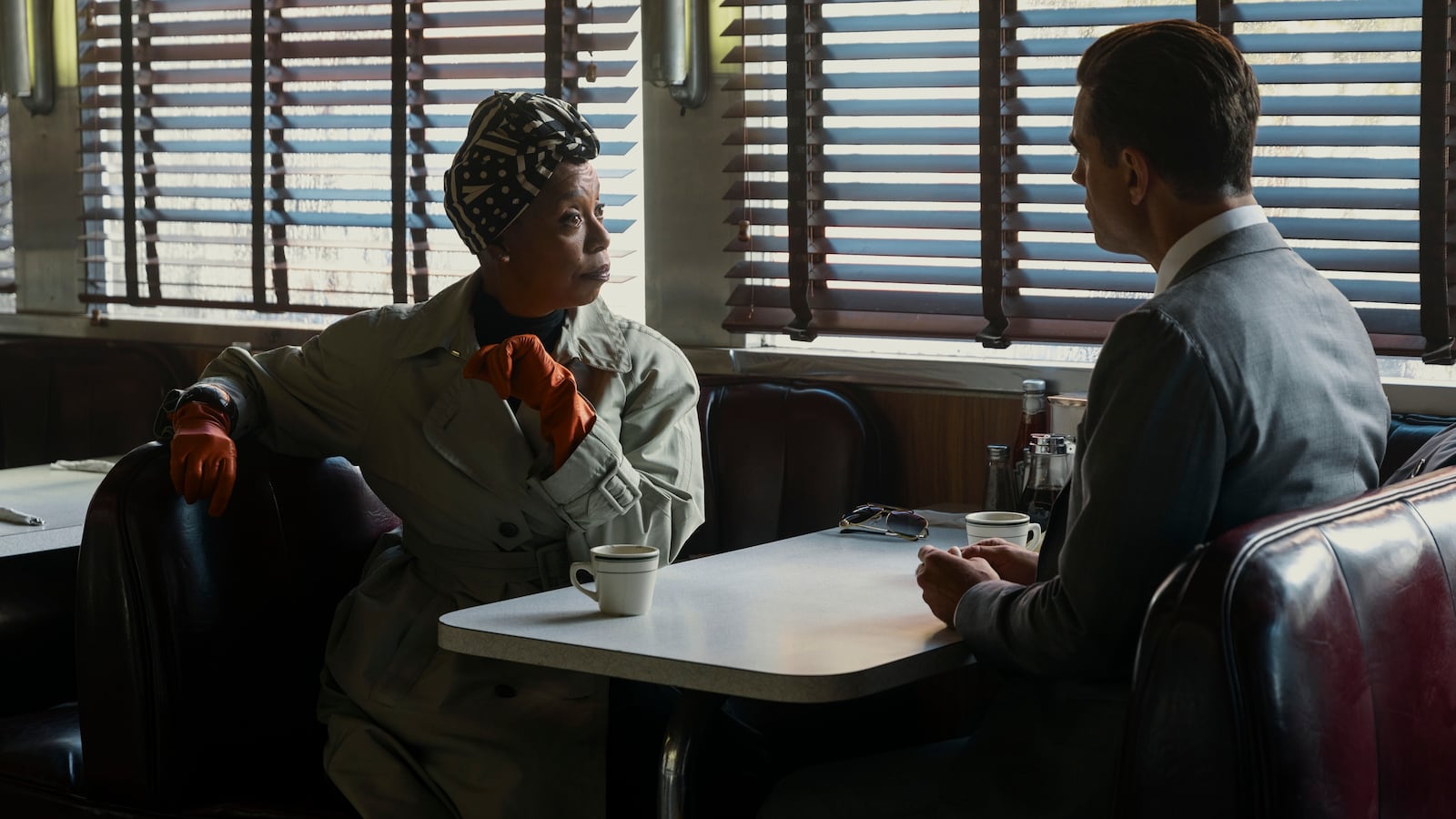The Watcher is a delirious, uh, watch. As is Ryan Murphy’s way, the new Netflix drama is a show operating on the highest frequency at all times. Maybe that’s necessary, considering the ripped-from-the-headlines premise is tantalizing, if threadbare: After moving into an expensive suburban Jersey home, a family starts receiving letters from an anonymous stranger. The letters become increasingly specific and creepy. The family sets about finding out who their stalker—a.k.a. “The Watcher”—is. Chaos ensues. (Parts of the series are rooted in the New York magazine investigation into a similar case, though Murphy and co. run amok fictionalizing much of it.)
(Warning: Spoilers ahead for The Watcher.)
The Watcher veers on being “too much” at all times. Every action, reaction, and inaction is ratcheted up to an outrageous level: The family’s teen daughter has a crush on a boy that ends with her destroying her father’s reputation on TikTok. The annoying husband-and-wife pair next door keep gardening on the family’s yard, then they turn up dead, but actually they’re alive, but then one of them dies anyway. The local police chief somehow has the power to tell the entire FBI to ignore the family’s distress calls.
Thank goodness The Watcher has a patron saint of elegant patience looking out for it—its own watcher, if you will. For as absurd as Private Investigator Theodora Birch (Noma Dumezweni) seems at first, she becomes The Watcher’s saving grace. She is the one heart with a normal BPM in a show where everyone’s pulse is way too fast.
After his family starts receiving the anonymous threatening letters, Dean Brannock (Bobby Cannavale) seeks out Theodora’s help, per the recommendation of the police department. (She apparently has a reputation for being good at sleuthing out these kinds of weird cases.) When Dean meets Theodora in the beginning of Episode 2, she immediately tells him her backstory—in a fittingly ridiculous, bizarre monologue.
“I was a jazz singer,” she says. But “as good a musician as I was, I was an even better drinker.” Her husband told her she either had to give up drinking or he’d leave her; she chose to keep drinking. But then she had a heart attack on-stage, so she went to rehab—where she became addicted to true crime. Now she’s a detective, because it’s more fun than drinking!

Dean is perplexed by this convoluted story and unsure of whether he should trust this woman. But Theodora tells him that she has liver cancer and a daughter, so she could really use the cash. (It’s an absurd backstory that just keeps on giving, truly.) Dean agrees to have her take on their case and help suss out who The Watcher is.
A trained theater actress, Dumezweni nails the delicate balance of Theodora’s inherent weirdness and the sense of gravity that she needs to bring to the show. This monologue is utterly gripping, not just because it’s strange—Theodora literally says she’s addicted to murder—but because she sells it completely. She gives a sense of tired, long-gone regret when she tells of choosing the bottle over her marriage; she admits that she’s dying of cancer in a matter-of-fact way, but it’s clear she’s belying her sadness.
Theodora is a woman who needs to help the Brannocks as much as they need her help, and every measured word, sigh, and glance subtly conveys it. As she continues to meet with both Dean and his wife, Nora (Naomi Watts), their trust in her only grows—as does ours. How could we not trust this impeccably dressed dying woman, who always wears tailored blazers, beautiful headwraps, and luxurious gloves? It helps that she’s the only person who takes the Brannocks seriously, never judging them for their increased paranoia.
What Theodora does offer is a sense of perspective, a great middle ground between the Brannocks’ neighbors’ bratty stance of “The Watcher isn’t real!” and Dean’s paranoia, accusing every single person he meets. Even when Theodora is wrong (and spoiler alert, she literally always is), she offers a well-reasoned explanation for why her suspect is the correct lead to follow. When Dean’s all like, “This guy is a freak, so he’s definitely the person who wrote the letters,” Theodora pulls him back; that guy may be weird, but she did the research, and, actually, he’s just got a mental illness. (The Watcher loves to demonize people with mental illness, but that’s for another blog.)

By separating Theodora from the rest of the melodrama the show is mired in—we only see her alongside the Brannocks, in neo-noir-ish settings like diners and dimly lit back rooms—she helps The Watcher maintain some semblance of grounding. All the hysterics surrounding the Brannocks’ lives keep leading to dead ends, giving the show a screeching start-and-stop cadence. But when Theodora is back on screen, there’s some forward movement; someone is actually doing the mystery-solving here on this mystery show. And that someone is more believable than beguiling, in a show that’s mostly the latter.
When Theodora finally succumbs to her illness in the penultimate episode, it’s hard to justify watching further—the real hero is gone. The Brannocks attend both Theodora’s hospital bedside and her funeral, which is the most human they seem throughout the whole series. But before she dies, she tries to turn herself into the villain, telling Dean that she was The Watcher all along. This, however, turns out to be a lie: Her daughter tells the Brannocks that Theodora only claimed to be The Watcher in the hopes that it would give the family some closure. She didn't want her final case to go unresolved, either.
The Watcher would have been better served by turning its focus toward Theodora and away from the vaguely supernatural, increasingly unbelievable main plot. There are plenty of aggrieved wealthy white people on TV as it is. How many shows can boast about their best character being a badass, true crime-loving, British-accented, Black female jazz singer-turned-private detective? The Watcher can, and it should be proud of it.






